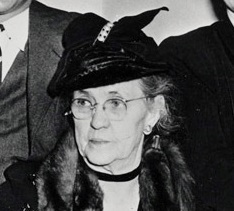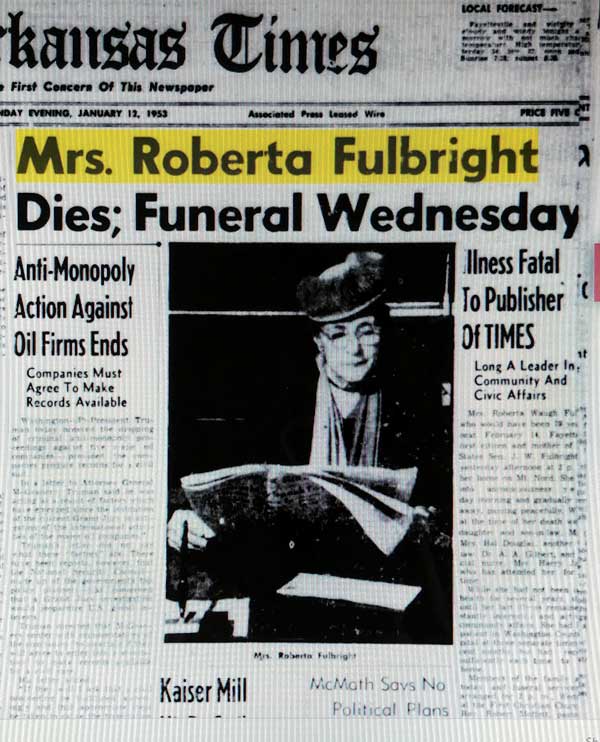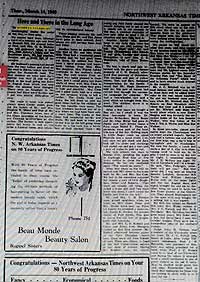Roberta Fulbright’s Memories of Southwest Hill
|
Community Radio show aired on KPSQ 97.3 FM: |

The Fulbright family were neighbors and friends with the Pratt family on Southwest Hill, also called Haskell Hill at the time, and now called Markham Hill and Haskell Heights. From Wikipedia: “Roberta Fulbright (1874–1953) was an American businesswoman who consolidated her husband's business enterprises and became an influential newspaper publisher, editor and journalist. She used her paper to push civic responsibility and women's rights. Fulbright was the 1946 Arkansas Mother of the Year, a co-founder of the Arkansas Newspaper Women (now known as the Arkansas Press Women) and was posthumously inducted into the Arkansas Women’s Hall of Fame in its inaugural group of honorees.”
Roberta Fulbright wrote an article in the March 14, 1940 edition of the Northwest Arkansas Times entitled, “Here and There in the Long Ago”, describing her memories of living on Southwest Hill in Fayetteville. Excerpts from the article follow.
Reminiscing seems the order of the day, so here goes.
We moved here from Missouri a third of a century ago and lived on Haskell Hill [Southwest Hill], the present home of Prof. and Mrs. G. D. Nichols. Our hill embraced what is now Mrs. Tom Ashury’s place and the Greahouse place. We had peaches, cherries and a great bed of asparagus.
My husband’s parents had moved here the year before and lived on the road to Elkins, which was then called the Huntsville Road. The first summer we were here Jay’s mother was very ill and we got stuck in the mud going out there in August from which you may infer the seasons have changed. There were no hospitals in the county but there were doctors and I got into ethical difficulties at once.
Our route to town was almost always down Center street, passing the homes of Mr. and Mrs. Stephen K. Stone and that of Mr. and Mrs. Theodore Jones, two of the finest examples of the Southern Colonial architecture in this section. The former is now apartments but lovely to look at, the latter a funeral home, still retaining its architectural beauty.
Those elegant pioneers, Mr. and Mrs. Stone and Mr. and Mrs. Jones have gone to their reward, their places are still serving these days and times.
Another home on Southwest Hill was that of Mr. and Mrs. Frank Ellis. They had a wonderful peach orchard and we had good times out there, for seldom has there been a more gracious and hospitable hostess than Mrs. Ellis. Her daughter, Mrs. Wayne Ashley, continues in her mother’s tradition. The well-known Cook orchard was being planted in those days, and I recall going out there south of town with Mrs. Cook to pick strawberries when they grew so lush and plentiful. Mrs. Cook and I piled rocks high as a stump on one occasion trying to kill a rattler. The Cooks lived just down the hill from us and the good times had by the children of the two families were many. The first kindness tendered any of us was when we had been here only a short time. The Cooks at that time had wonderful berries and fruits. We had been to town and on our way up the hill going home there on a big rock was a lovely box of fruit marked “Jack.” My young son Jack fairly cleared the wheels jumping out to get it and it stands out in my memory to this day, a constant reminder of how new folks do need a bit of attention and how they love it.
Another family who loomed large in our early days were the Pratts who are still holding the hill. The Pratt girls, Joy and Tooie (Evangeline) were friends of my girls, Lucille and Anna. Evangeline is now Mrs. J. S. Waterman, wife of Dean Waterman.
We had a coach and pair inherited with the place and former property of C. N. Haskell, afterward first governor of Oklahoma. This carriage and pair of yellow horses, Tom and Bert, furnished transportation for the family. I recall that Mr. High Dinsmore told me this pair of horses had carried him through his successful campaign for congress. We had a two-wheeled cart and a pony which we brought from Missouri. The children drove it to Sunday school.
After a few years we bought a Reo car. As I recall it was the first two-seater in town. Dr. Charles Richardson, Harry Baum and Dr. Otey Miller had gone to Joplin and each driven home a Ford coupe Model T. These experiences were part of the local folk-lore of the day. Getting stuck in Little Sugar creek up about Pineville was a usual event. I recall once we got stuck and Jack took off his shoes and stockings and waded out and got a man and a pair of mules to pull us out.
After five years on the hill we moved onto Hill street to the home built by Mr. and Mrs. Ike Cole. We had in the meantime acquired fair means a pair of twin daughters, Helen and Roberta. They were six months old when Jay called a truce and said “we must move into town. I can’t corral the family and live on the hill.”

Haskell Heights today in the Spring, the road leading to the old Haskell/Fulbright/Nichols house.
This quiet part of Markham Hill would be destroyed by the adjacent SREG-proposed 144-acre development.
Below is a summary of Roberta Fulbright’s life, extracted from Wikipedia.
Roberta Waugh was born on February 14, 1874, in Rothville, Missouri to Pattie (née Stratton) and James Gilliam Waugh. She grew up on her family's farm in Rothville and attended school, church services at the Missionary Baptist Church, and learned to play the piano and organ. When she was sixteen, she passed the examination of Chariton County and obtained her first teaching position. Her parents sent her away to attend high school in Kansas City and then to a two-year college program at the University of Missouri to allow her to be fully certified as a teacher. Waugh took advantage of her college experience and excelled in studies which interested her like English and history. She joined the Kappa Kappa Gamma sorority, participating in a variety of social and intellectual events, including attending a lecture by Walter Williams, founder of Missouri's school of journalism. The lecture inspired a lifelong interest in journalism, but she returned to Rothville to become a teacher.
On 30 October 1894, she married Jay Fulbright, a local man whose parents were also farmers in the community. The couple began their life on a farm and started their family. Within a few years, they had accumulated enough money to purchase a bank in Sumner, a nearby town, and relocated there. Fulbright had four children over the next few years—Frances Lucile, Anna, Jay Jr., and James William—yet found time between raising the children to help at the bank. In 1906, the family moved to Fayetteville, Arkansas and Jay became involved in several business ventures including becoming president of the Arkansas National Bank. Jay's business strategy was to locate businesses that were struggling, buy them, get them back on solid footing and then resell them to recoup his investment for a profit. In this way, he became a stockholder in Arkansas National, as well as Citizens Bank in Fayetteville and an investor in other banks in nearby towns. He purchased timber interests, real estate, groceries, a poultry plant, an ice company, lumber company, a hotel and a publishing house, among others. During these years, Roberta was involved in her family and civic and social clubs and in 1911 gave birth to their last two children, twin girls, Roberta and Helen. The family thrived, their business grew, they contributed to the development of their community and then in a sudden illness lasting just 56 hours, Jay died on July 23, 1923.
Jay died without a will and his various business partners took action to protect their own interests. Competitors, sensing she was vulnerable, and even partners began filing legal claims and demanding prompt payments. Fulbright was appointed to fill Jay's unexpired term as a director at Arkansas National Bank, becoming the first woman bank director in Fayetteville. Fulbright however traded her bank shares for a controlling interest in the Washington Hotel. The hotel was the largest establishment of its kind in northwest Arkansas. It was also landlord to the bank and within six months, Fulbright was able to evict the bank. The lawsuits against her husband's former estate also included those by Josephine Waugh, her brother Tom's widow, who filed suit to protect her interest in the Coca-Cola Bottling franchise and ice business. The business was placed on the auction block and Fulbright was able to secure the highest bid. Within a relatively short period of time, Fulbright was able to consolidate some assets, liquidate others and stabilize the business holdings of the Fulbright Investment Company, dashing the ideas that she would not be able to run the businesses. Amid her business difficulties, Fulbright took a course in 1925 in English composition and then focused on her newspaper business, Fayetteville Daily Democrat, to consolidate her influence. By 1926, she secured full interest in the newspaper.
In 1933, Fulbright began writing a column in the Democrat called "As I See It". The column was an editorial covering an eclectic mix of topics from women's equality to war to gardening to politics, tourism, philosophy, and many others. It is estimated that in her twenty-year career, she wrote around 2 million words. In the mid-1930s Fulbright decided to take on political corruption, calling for an audit of the county's books and writing about a stolen car ring involving local officials. She was concerned about the judiciary that sheltered the bootlegging, corruption, fraud and graft, but also was angry that county contracts only went to cronies or those willing to pay for protection. Her exposure of the corruption and a sheriff who pled guilty to conspiracy in federal court increased Fulbright's regional reputation and a candidate she endorsed won election in 1936. In 1937, the newspaper was renamed The Northwest Arkansas Times to reflect its goals for broader reach.
In 1939, Fulbright's son Bill was appointed by Governor Carl Bailey, a candidate Fulbright had endorsed, as president of the University of Arkansas. In 1940, Bailey was bested in the governor's race by long-time rival Homer Adkins, who replaced Bill as university president in 1941. The following year, Bill won a seat in the U.S. House of Representatives and in 1944, beat Adkins in a bid for the Democratic nomination for the U.S. Senate. In 1946, Fulbright was named by the Golden Rule Foundation as Arkansas Mother of the Year. In 1949, Fulbright established a scholarship fund for the journalism school at the University of Arkansas and published a book of poetry which she gave as Christmas gifts. That same year, she helped found the Arkansas Newspaper Women and the following year was named as its honorary lifetime president. In 1952, she published a collection of her "As I See It" columns.
Fulbright died on January 11, 1953, in Fayetteville, Arkansas. Posthumously, the University of Arkansas established a memorial bookshelf in her honor and in 1959 named a women's residence hall in her honor. In 1961, a new public library was built bearing her name and the dining hall of the University of Arkansas was renamed in her honor in 2012. She was one of the inaugural women inducted into the Arkansas Women’s Hall of Fame in 2015.

|

|
| Click on image to enlarge. | |